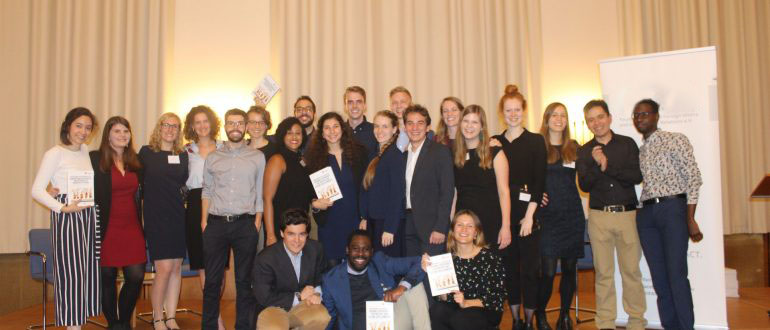
The LACalytics 2018 Conference in Hamburg
The Young Initiative on Foreign Affairs and International Relations (CISS) invited 18 students and young professionals from 10 different countries to participate in the LACalytics 2018 conference taking place in Hamburg, Germany from October 20th until October 24th. The conference marked the conclusion of the LACalytics 2018 programme, which was supported by the German Federal Foreign Office and the EU-LAC Foundation. LACalytics aims at facilitating interregional cooperation of the young generation from Europe and the Latin America-Caribbean region (LAC).
The uniqueness of the programme thereby lies in two aspects: first, LACalytics is organized by and targeted at students and young professionals and provides them with a platform to share their opinion and to express their views on EU-LAC relations. The programme publishes articles that cover topics of relevance in Europe as well as in LAC, thus fulfilling the second aim: bi-regionality. This aim is as well fulfilled on a very personal level as the articles have been co-authored by one author from Europe and one from either Latin America or the Caribbean. The authors thereby worked with case studies to underline that Europe and the LAC-region – regardless all the differences not only between but as well within the regions – in fact share similar challenges, and to outline how both regions can learn from each other.
The articles cover a broad range of topics ranging from politics and economics, to environment, culture, and science. During the conference, the participants debated what they consider being the most pressing issues in Europe and LAC. The first pressing issue was identified as being human rights, social inclusion, and threats to democracy. Topics such as bilingual education for minority linguistic groups, Gender Ideology and LGTB+ rights, social critique in popular culture, and the role of regional organizations concerning authoritarian tendencies within their member states are analysed. The authors conclude that both, Europe and the LAC-region, need to strengthen the protection of minority rights and foster communication and mutual understanding. This includes a stronger role of regional organisations in protecting democracy.
Research on gender-inclusive climate finance builds the bridge to another key topic of relevance in both regions: climate change and sustainability. Additionally, socio- environmental impacts of gold exploitation, flood management systems, and approaches of development banks on how to combat deforestation are the research focus of the articles. Taking gender equality into account and thus strengthening the role of women was identified as one of the key success factors, as well as respecting indigenous techniques and bi-regional knowledge exchanges. Moreover, an article looking at the sustainability of lithium batteries highlights that we must not forget about the ripple effects that their usage will have on other parts of the world because global challenges require global solutions.
The shift in global power dynamics was considered being the third pressing issue, with a special focus on how the increasing presence of China in the LAC-region influences future EU-LAC relations. Diversification, appropriate regulatory framework and expanding technological cooperation hold economic and political opportunities for macroeconomic stability and strong political ties with communication and knowledge exchange being key issues. During the conference, the participants engaged in vivid debates with their peers. The findings were presented during a public event attended by representatives of the German Federal Foreign Office, the EU-LAC Foundation, the Diplomatic Corps, several companies, and the civil society.
This article was published in December’s (2018) issue of the Diplomatic Magazine.
